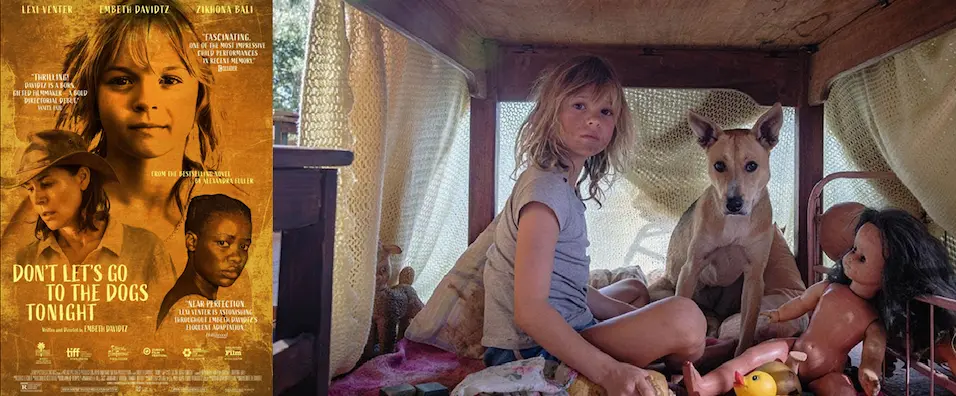
Embeth Davidtz’s directorial debut Don’t Let’s Go to the Dogs Tonight is a searing adaptation of Alexandra Fuller’s memoir, capturing the innocence and brutality of colonial Zimbabwe
A Child’s Gaze on a Nation’s Collapse
Set in 1980 Zimbabwe, formerly Rhodesia, the film follows eight-year-old Bobo played with haunting authenticity by newcomer Lexi Venter, as she navigates a world unravelling around her. Her family, white settlers clinging to fading privilege, live on a farm surrounded by political tension, racial inequality, and emotional decay.
Director Embeth Davidtz, who also stars as Bobo’s mother Nicola, anchors the narrative in Bobo’s perspective. This choice transforms the film from historical drama into emotional memoir. Bobo’s innocence is pierced by the violence she witnesses, the racism she parrots, and the grief she doesn’t fully understand.
From packing bullets at breakfast to fearing “terrorists” in the bathroom at night, Bobo’s world is shaped by adult paranoia and inherited prejudice. Yet, her bond with Sarah, the Black housekeeper, offers moments of tenderness and contradiction highlighting the complexity of relationships forged in unjust systems.
Davidtz’s decision to cast an untrained child actor pays off. Venter’s performance is electric feral, vulnerable, and utterly believable. She doesn’t act the part; she lives it.
Embeth Davidtz’s Triple Triumph, Director, Actor, Storyteller
Embeth Davidtz, known for her roles in Schindler’s List and Matilda, emerges here as a formidable auteur. After eight years of development, she adapted Alexandra Fuller’s memoir with surgical precision and emotional depth. Her portrayal of Nicola a grieving, alcoholic mother unravelling under the weight of loss and political change is both brutal and heartbreaking.
Davidtz’s own childhood in apartheid-era South Africa informs the film’s emotional texture. She’s said the story mirrors her own experience of growing up in a world where violence was normalized and explanations were elusive. That personal connection infuses the film with authenticity.
Shot in South Africa on a modest budget, the production team led by Helena Spring, Paul Buys, and executive producers Anele Mdoda and Trevor Noah crafted a visual palette that’s both intimate and expansive. Cinematographer Willie Nel channels the dusty heat and emotional claustrophobia of the farm, while composer Chris Letcher’s score underscores the tension and tenderness.
The film premiered to critical acclaim at Telluride, Toronto, and Zurich film festivals, with Sony Pictures Classics securing global distribution. It officially releases in theatres on July 11, 2025, followed by a streaming debut on Prime Video later in the month.
Memory, Identity, and the Politics of Storytelling
Don’t Let’s Go to the Dogs Tonight is not just a film, it’s a reckoning. It confronts the legacy of colonialism, the emotional cost of war, and the fragility of identity. Through Bobo’s eyes, we see how children absorb the ideologies of their environment, often without understanding them.
The film doesn’t offer easy answers. Nicola’s rage, Bobo’s confusion, and Sarah’s quiet resistance all coexist in a narrative that refuses to sanitize history. It’s a story of loss, of land, innocence, and illusions.
Critics have praised the film’s refusal to moralize. Instead, it invites viewers to sit with discomfort, to question inherited beliefs, and to recognize the humanity in flawed characters. It’s a rare cinematic experience that balances political critique with emotional nuance.
Davidtz’s directorial voice is clear: storytelling must be personal, political, and unflinchingly honest. In choosing to tell Fuller’s memoir through a child’s lens, she amplifies the emotional stakes and challenges viewers to confront their own biases.
Final Thoughts: A Film That Dares to Feel
In an era of spectacle and sanitization, Don’t Let’s Go to the Dogs Tonight dares to feel. It’s a film that doesn’t flinch from grief, from racism, from the messy truths of history. It’s not just a story about Zimbabwe; it’s a story about all of us how we inherit pain, how we survive it, and how we tell it.
Whether you’re drawn to its historical context, its emotional depth, or its cinematic craft, this film demands attention. And it rewards it, with a narrative that lingers long after the credits roll.
Stay updated with the latest news on Rapido Updates. Keep yourself updated with The World, India News, Entertainment, Market, Automobile, Gadgets, Sports, and many more
1 thought on “Innocence Amid Ashes: A Bobo’s Journey Through a Dying Empire”